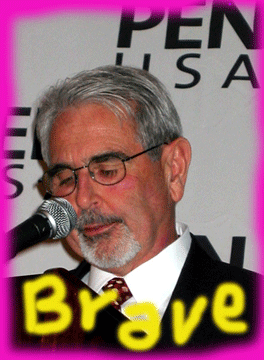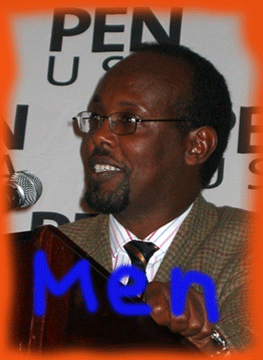It’s been the week of journalism awards. Last Tuesday, the Courage in Journalism event. Then, last night it was PEN USA’s turn to give awards to some brave people in our profession
PEN also gave out a bunch of well-deserved literary awards, and some other special honors. But the heart of the evening has always been the Freedom to Write Award and the First Amendment Award
It’s the wee hours and I’m a bit champagne-addled, so I’ll make this short. But I don’t want to shut down the computer without introducing you to the two people who received those central awards:
This year, the First Amendment prize went to Jerry Roberts, the guy who resigned as executive editor of the Santa Barbara News-Press after the paper was bought by billionaire Wendy P. McCaw, a woman who seemed to believe that, purchasing a newspaper was sort of like purchasing a summer home in the Hamptons. You got to invite all your friends over, then you and they could do whatever you wanted. In McCaw’s case this meant dictating the papers content, as if it was her own private country club newsletter.
The News-Press wasn’t exactly the New York Times but, for years, it had been a fine and feisty paper, and editor Jerry Roberts felt honor-bound to do whatever he could to temper McCaw’s actions.
As Roberts put it: “Newspapers have a duty to honor the extraordinary powers granted them by the First Amendment through the process of exercising those powers in the public interest…” Finding himself in a situation where McCaw continued to demand that the staff violate the most basic of journalistic ethics, Roberts resigned. Then—as she seems to do whenever anyone crosses her—McCaw retaliated by smearing Roberts, linking him to child pornography, and suing him for big bucks.
And then things really started to get ugly.
Yet whatever difficulties might plague American journalists, they pale in the light of the threats and terrors that Freedom to Write winner, Sahal Abdulle, had to face every day to report the news in Mogadishu, Somalia for Reuters.
Here’s Abdulle’s poetic and heartbreaking description of one of the worst of those dark days.
I am in a car full of journalists driving from the funeral of a colleague murdered hours earlier in Mogadishu for doing his job. We don’t get far.
An explosion throws our vehicle up and fills it with excruciating heat. Black smoke billows about us. I can feel the pressure rushing up inside my clothes, my neck splits open.Climbing from the smoking wreck, blood spits through the fingers I clamp to my throat.
It was a remotely detonated bomb. Death is often random in Mogadishu, but in this case we were the target.
Journalist, friend, and founder of local media house HornAfrik, Ali Iman Sharmarke, lies dead beside the wreckage.
Amid the chaos and pain, I scan the crowd, looking for a doctor to help, or maybe the killer.
Somalia has become one of the most dangerous places on earth to be a journalist. I spent the last year there, staying in my family house, during some of the worst violence to hit Mogadishu in the last two decades.
I saw countless burned bodies in hollowed-out houses, the corpses of 90-year-olds and infants ripped to pieces. I watched colleagues die trying to get the Somali story out to a world already jaded by wars in Iraq, Darfur and Afghanistan.Riven by conflict since the 1991 ouster of a military dictator left Somalia in anarchy, Mogadishu is wracked by an Islamist-led insurgency against the government and its Ethiopian military allies.
My colleagues and I in Somalia often talked about why we did the job. Some of us had left lives and families in the West. Mine was in Canada.
Ali and I asked each other that question many times. He too had a Canadian passport. Ali believed until the end that he was giving Somalis a voice and, like me, kept coming back.
We all had our own way of coping. A motley crew of reporters used to hide out at my Mogadishu home. They teased me about the hours I spent every day with my eyes closed, blocking everything out, listening to John Coltrane.
When the violence woke us before dawn, I tended to my garden. I planted 72 new species this year. The Australian at head office in Nairobi called me The Constant Gardener.
I once forced a reluctant taxi driver to help me save a tortoise. It was caught in the crossfire on a city street. I adopted him. You need to protect something amid such danger…..



I’m supposed to think that a person has a “freedom to write” whatever he wants, when his employer doesn’t like what he writes? The freedom of the press in the first amendment exists between the pubishers and the public–not between the publishers and its employees. Roberts isn’t a hero. He quit before he was fired. That just shows the ignorance of those who gave the award. Let him go to the Village Voice or Mother Jones, if his style is more suited to them.
Oh, if you want to really understand suppression of speech, be sure to read what the left-wing CBS and press in general did to Bernard Goldberg in the first chapters of his book “Bias.” They tried to ruin this man for doing what a journalist should do–ask tough questions to expose the truth. Where’s his award?
(Your link to “really started to get ugly” goes no where.)
Wow, I actually agree with Woody. If a wealthy divorcee wants to purchase a rinky-dink newspaper and change the news format that is her prerogative. Maybe the rich ladies in Montecito should not serve defenseless turkeys and chickens at their dinner parties, and that story needs to be covered.
A reporter working in Mogadishu is a brave reporter. There are/were many dead brave reporters across the border in Tijuana. The reporters in Tijuana who write about drug cartels and corrupt cops, politicians and military are brave reporters. I’m not sure an editor trying to “save†a newspaper is brave, maybe he is just a dedicated newsman.
“And then things really started to get ugly.” The link is dead. Too much champagne?
“The link is dead. Too much champagne?”
(Uh, well, several of the less mature among us snuck in some nice, chilled bottles of Schramsberg Blanc de Noirs for our tables, which seemed like a really good idea at the time….)
Probably “dedicated newsman” is more accurate. But “Brave” made for an easier graphic. What the two men did isn’t comparable, obviously.
BTW, Woody, if you’d followed the whole story, I suspect even you would have been appalled by Miz McCaw.
By the way, we had to actually consult lawyers before we could commit to honoring Roberts—which was a new one. There was the suggestion that McCaw was going to sue for defamation because PEN gave Jerry Roberts this award. Quite the piece of work, that Wendy.
For the record, had it been left up to me—which it wasn’t, as I wasn’t on the awards committee this year (as I often have been in the past)—I’d have given Roberts an award that was differently skewed than our traditional 1st Amendment Award, as he didn’t risk incarceration or anything similar, to protect freedom of expression. What he did required lots of backbone and a clear sense of journalistic ethics, and it was great to honor him—and by extension the many other reporters and editors who walked out with him. But it wasn’t quite a 1st Amendment issue.
Thanks for the clarification on what happened at the Awards. I was put off both by Wendy McCaw’s tactics, incl. threatening to subpeonae anyone who attended the event, and by the fact that this is what got the 1st Amendment Awards. Roberts made a choice that exposed her dictatorial disregard for journalistic ethics, but it’s not all that different from what has gone on in other papers which downsize, get Murdoch-like or Tribune-cheap owners, etc. While I totally support and have been involved w/ International FTW over the years, this is one reason I usually avoid PEN events — a lot of middle- aged and older people patting themselves on the back for their bravery, for opposing things like this or a library somewhere “banning” a book parents find offensive.
It’s definitely the International Freedom-to-Write recipients, and numerous unsung “honorary members,” that put things into perspective.
Celeste, I can’t stand George Steinbrenner and his goofy sons, but that doesn’t cause me to consider Joe Torre any braver or dedicated just because he became the new skipper for the Dodgers.